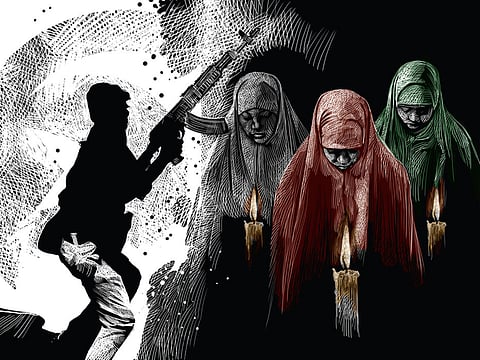Peaceful coexistence matters above all else
The group of Muslim women on a bus in Kenya humble us by risking their lives to save Christian co-passengers

As the majority of the Christian world celebrates Christmas, the whole of humanity can share in the wider message, wishing for peace on Earth and goodwill to all mankind — which is not easy in a world where we like to emphasise our differences and overlook what we share.
But sometimes, remarkable acts of individual courage remind us of what is possible and force us all to question our own willingness to put our own lives at risk should we ever have to face such a trial.
This week, a bus in Kenya was attacked by Al Shabab militants as it travelled to the city of Mandera on the border with Ethiopia and Somalia. As they have done several times before, the gunmen ordered the Christians to get out so that they could be killed.
What happened next was remarkable as the Muslim women in the bus refused to be separated from their fellow passengers. Some Muslims gave Christian women their hijabs in order to confuse the gunmen, while others were helped to hide behind the piles of baggage in the bus. The Muslim women told the gunmen to kill them all or leave them alone. The gunmen walked away, although they did kill two men, one of whom was passing by and the other was running away. All the women survived.
It must take great courage to make such a commitment under the eyes of wild young men with their guns trained on you, in the full knowledge that other gunmen have been willing to kill an entire busload of people. It is hard to imagine what the women were thinking at the time: It may be that they were so outraged at what was happening that they acted without very much thought, or they might have been fully aware that they were standing up for what was right. They certainly knew they were in grave danger and images would have flashed through their minds of their homes and loved ones who they might well have never seen again. Yet, they went ahead and saved their fellow travellers from certain death.
Religious leaders
These ladies’ individual acts of selfless sacrifice in a bus in a rural Kenyan desert are the other end of the spectrum from the world’s religious leaders gathering to encourage interfaith dialogue, though the one cannot work without the other. Tolerance and cross-religious affinities cannot be ordered from the top, but these vital discussions help set a framework in which individuals make their own choices based on their humanity and social environments.
There are many interfaith meetings that regularly bring together leaders from all faiths, which are all based on the premise that people of different beliefs can share mutual tolerance, even if their beliefs are mutually exclusive and at odds with each other, as they must be by definition.
One example of such work is the King Abdullah Bin Abdulaziz International Centre for Interreligious and Intercultural Dialogue, which seeks to create change by empowering and encouraging dialogue among followers of different religions and cultures around the world.
Another example is the annual G20 Interfaith Summit, which seeks to reinforce the importance of dialogue among religions and cultures, which was reaffirmed by Shaikh Nahyan Bin Mubarak Al Nahyan, UAE Minister of Culture, Youth and Community Development, when he attended the summit in 2014 and affirmed the importance of seeking solutions to the problems faced by humanity through religious dialogue.
It is very important that this network of interfaith initiatives combines to strengthen the tolerant tone set by leading Muslim scholars like Grand Imam of Al Azhar, Dr Shaikh Ahmad Al Tayyeb, and Shaikh Abdullah Bin Bayyah, and Christian leaders like the Catholics’ Pope Francis and the Anglicans’ Archbishops Justine Welby and Desmond Tutu.
Human shield
But despite all this leadership, it has to come back to individuals wanting to stand up for what is right. In the turbulence of 2011, after the first revolution, Egypt faced a grave danger from extremists who sought to exploit the interim government’s weakness and harm the country’s Christian minority.
As a result, hundreds of motivated Egyptian Muslims offered themselves as ‘human shields’ to protect the Copts during their celebrations of Christmas in January 2012, only a week after a suicide bomber had killed 21 Christians and injured more than 80 in Alexandria.
Ahram-on-line quoted Mohammad Al Sawy, a Muslim arts tycoon credited with initiating the “human shield” idea, as saying: “We either live together, or we die together.”
And Dalia Mustafa, a Muslim student who attended mass at the Church of the Virgin Mary Church in Maraashly, said: “We are one. I am standing with the Copts because the only way things will change in this country is if we come together.”
The women on the bus in Kenya and the Muslims visiting the churches in Egypt are a few examples of many millions of people around the world who seek no more than to live together in peace, and get on with their lives. We all need to support what they have stood up for.


